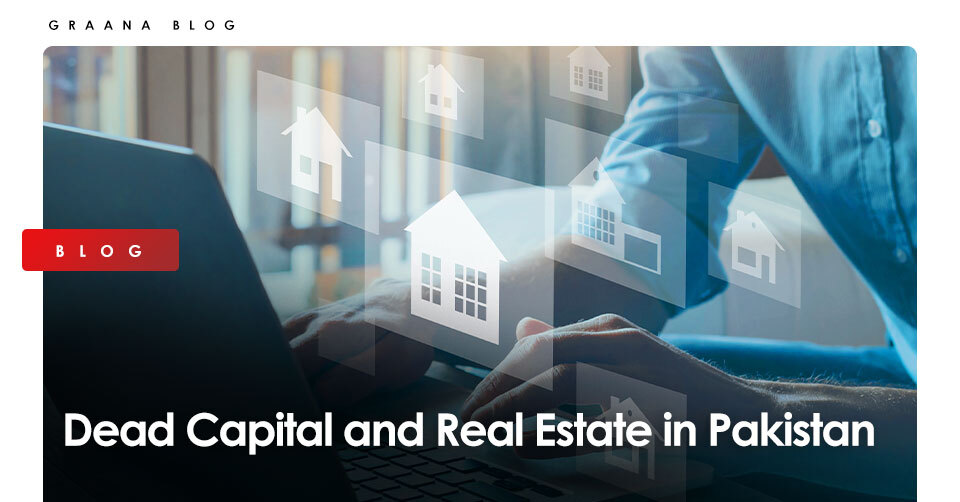
The central idea of this blog is based on the book ‘The Mystery of Capital: Why Capitalism Triumphs in The West and Fails Everywhere Else’ by Hernando de Soto. The writer has presented the idea that why developing state has been unable to cash on the assets they possess and why such assets are no more than a ‘Dead Capital’. The presence of informal and unregulated sectors combined with the lack of formal rights in developing countries is the primary reason behind the conversion of assets into productive and useful capital. Pakistan also represents a classical case of dead capital, and if given proper attention the economic growth of Pakistan can be put on a higher trajectory of growth.
Against this backdrop, Graana.com has identified the real estate sector of Pakistan as one of the major sectors which is one of the contributors of the dead capital in Pakistan. As put forth by De Soto, Assets or Real Estate in Pakistan, and most of the developing countries serve the physical needs, for example, the land is used for the purpose of housing, shelter, and harvesting; in the case of the west, the same land is serving a parallel purpose for instance, as a ‘collateral’ for a mortgage.
The concept of Dead Capital has been explained above however, for more clearance and a vivid picture the idea of De Soto will be explained. Imagine a building or an adobe is only serving a primary purpose of its creation whereas it can be also used as a tool for creating capital. Such an asset that does not serve a dual purpose can be termed as dead capital. De Soto in his book has explained this concept with the following analogy: like a single brick can release an exponential amount of energy in case of a nuclear explosion. Similarly, the assets in the form of buildings and lands hold great potential for energy that can serve a dual purpose. ‘Capital is not the accumulated stock of assets but the potential it holds to deploy new production.’
We may be wondering why dead capital exists in real estate and why we have been unable to deploy the new production. According to De Soto, the answer lies in the lack of regulation of real estate and the laws that try to regulate this sector. The procedures that allow the transfer of a real estate asset are so convoluted and time-consuming which makes the asset unproductive and becomes a reason behind the loss of capital. Often, the land or a plot can not be traded in the markets since the owner of that land is not clear or the land is under a process of litigation. As per De Soto, 80pc of the world’s assets are decapitalized. Thus, we can deduce that a legal and efficient legal framework is required for avoiding dead capital.
In search of sustainable solutions for resolving the economic problems of Pakistan, over the time period, various governments have explored various options however, the tendency which the public lands hold in terms of capital is yet to be utilised. On the contrary, what is being observed is that the public land is either used for the construction of housing societies or is being encroached upon, therefore, putting a bar over the potential of real estate. Taking the example of Islamabad, the valuable land in the major sectors is either being used for the residents of government employees which represents the example of the dead capital.
There exists a correlation between a nation’s wealth and its property rights system. In the book, De Soto also shed a light on undefined property rights that hamper the creation of capital. The framework of property rights in Pakistan is archaic thus becoming an impediment in the formalization of the real estate sector. As a result, the consequences can be seen in the problems faced while fixing the ‘Economic Potential of the Asset’. This is the reason that the real estate market of Pakistan is very fluid and prices keep on fluctuating. Moreover, if there are no guarantees to whom a parcel of the land belongs then putting a piece of land as collateral or as security becomes difficult.
Grab the best options for Residential Properties for Rent:
Members of the National and Punjab Assemblies have lauded the provincial government’s plan to introduce…
ISLAMABAD: The Capital Development Authority (CDA) has recorded a historic development expenditure of Rs25 billion…
ISLAMABAD: The federal government is set to inaugurate the Islamabad Information Technology Park on August…
Lahore, April 23, 2025 – The city of Lahore has successfully completed the construction of…
ISLAMABAD, Pakistan – April 23, 2025 – Chaaye Khana, Pakistan's popular cafe renowned for its…
ISLAMABAD: Prime Minister Shehbaz Sharif laid the foundation stone for the Murree Road underpass on…